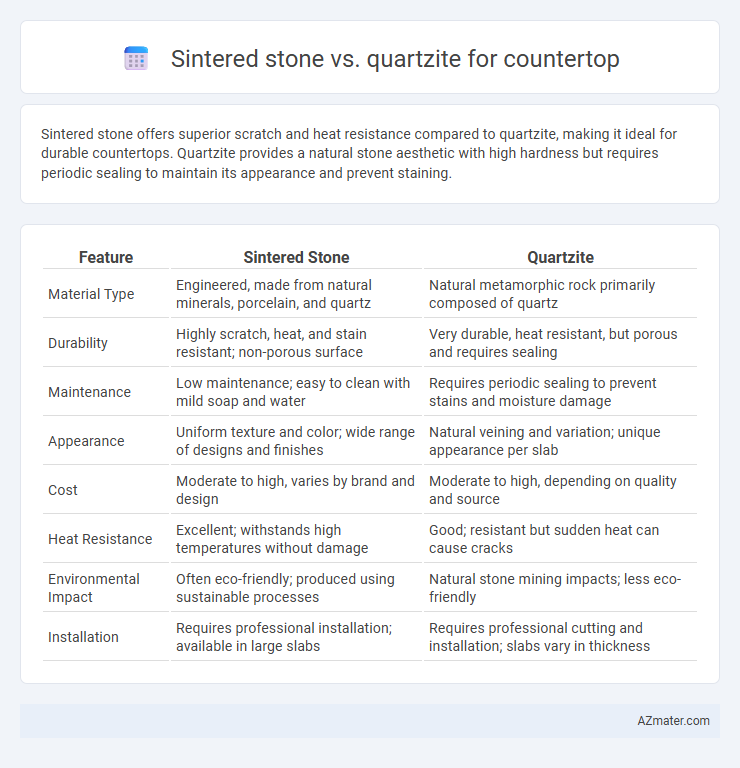Sintered stone offers superior scratch and heat resistance compared to quartzite, making it ideal for durable countertops. Quartzite provides a natural stone aesthetic with high hardness but requires periodic sealing to maintain its appearance and prevent staining.
Table of Comparison
| Feature | Sintered Stone | Quartzite |
|---|---|---|
| Material Type | Engineered, made from natural minerals, porcelain, and quartz | Natural metamorphic rock primarily composed of quartz |
| Durability | Highly scratch, heat, and stain resistant; non-porous surface | Very durable, heat resistant, but porous and requires sealing |
| Maintenance | Low maintenance; easy to clean with mild soap and water | Requires periodic sealing to prevent stains and moisture damage |
| Appearance | Uniform texture and color; wide range of designs and finishes | Natural veining and variation; unique appearance per slab |
| Cost | Moderate to high, varies by brand and design | Moderate to high, depending on quality and source |
| Heat Resistance | Excellent; withstands high temperatures without damage | Good; resistant but sudden heat can cause cracks |
| Environmental Impact | Often eco-friendly; produced using sustainable processes | Natural stone mining impacts; less eco-friendly |
| Installation | Requires professional installation; available in large slabs | Requires professional cutting and installation; slabs vary in thickness |
Introduction: Sintered Stone vs Quartzite Countertops
Sintered stone countertops offer exceptional durability, resistance to heat, scratches, and stains due to their engineered composition of natural minerals fused under high pressure and temperature. Quartzite, a natural metamorphic rock, delivers unique veining and hardness comparable to granite, making it a popular choice for durability and aesthetic appeal in kitchen and bathroom surfaces. Comparing sintered stone vs quartzite, homeowners should consider factors like maintenance, cost, and visual uniformity to select the best option for long-lasting countertops.
Material Composition: What Sets Them Apart
Sintered stone is composed of natural minerals fused under extreme heat and pressure, creating a dense, non-porous surface resistant to scratches and heat. Quartzite, a natural metamorphic rock primarily made of quartz crystals, offers a durable, heat-resistant countertop option but typically requires sealing to prevent staining. The key difference lies in sintered stone's engineered, uniform composition versus quartzite's natural variation and porosity.
Appearance and Design Options
Sintered stone offers a vast array of colors and patterns, including highly detailed designs that mimic natural materials like marble and granite, making it ideal for modern and customizable countertops. Quartzite, a natural stone, features unique, natural veining and earthy tones that provide a classic, elegant look with subtle variations in each slab. Both materials offer durability, but sintered stone excels in uniformity and design versatility, while quartzite stands out for its authentic, organic appearance.
Durability and Strength Comparison
Sintered stone exhibits superior durability due to its manufacturing process, which fuses natural minerals under extreme heat and pressure, resulting in enhanced resistance to scratches, heat, and stains compared to quartzite. Quartzite, a natural metamorphic rock, offers excellent hardness and strength but can be more porous and prone to etching from acidic substances without proper sealing. For long-lasting countertops in high-traffic kitchens, sintered stone provides greater non-porous resilience and lower maintenance requirements than quartzite.
Resistance to Heat, Scratches, and Stains
Sintered stone offers superior resistance to heat, scratches, and stains compared to quartzite, making it highly durable for kitchen countertops. Quartzite is heat resistant but may be more susceptible to etching and staining without proper sealing. Both materials require maintenance, but sintered stone's non-porous surface ensures better long-term performance against everyday wear and tear.
Maintenance and Cleaning Requirements
Sintered stone offers superior resistance to stains, scratches, and heat, requiring only mild soap and water for regular cleaning, making maintenance straightforward and low-effort. Quartzite, though durable and resistant to heat, demands periodic sealing to prevent staining and requires non-abrasive cleaners to maintain its polished finish. Both materials resist moisture well, but sintered stone's non-porous surface gives it a clear advantage in ease of upkeep and longevity in countertop applications.
Installation Process and Considerations
Sintered stone countertops require precise cutting with diamond-tipped tools due to their extreme hardness, demanding professional installation to avoid chipping or cracking. Quartzite, while also hard, offers slightly more flexibility during fabricating and can be worked with conventional stone fabrication equipment, but still requires skilled installers to handle its natural fissures and ensure proper sealing. Both materials necessitate careful handling, with sintered stone often preferred for its lightweight properties and superior scratch resistance, influencing the complexity and cost of the installation process.
Environmental Impact and Sustainability
Sintered stone boasts a low environmental impact due to its manufacturing process, which uses natural minerals fused under high pressure and temperature without resins or adhesives, making it highly recyclable and durable for countertops. Quartzite, a natural metamorphic rock, offers sustainability through its natural abundance and longevity but requires significant quarrying, which can lead to habitat disruption and higher carbon emissions from extraction and transportation. Choosing sintered stone often supports a more sustainable countertop option by minimizing resource depletion and promoting eco-friendly production practices.
Cost Comparison: Sintered Stone vs Quartzite
Sintered stone countertops typically cost between $50 and $150 per square foot, offering a budget-friendly alternative to quartzite, which ranges from $70 to $200 per square foot depending on rarity and quality. Installation expenses are comparable for both materials, but sintered stone's lower material cost often results in overall savings. While quartzite commands a higher price due to its natural stone composition and limited supply, sintered stone provides a cost-effective, durable, and aesthetically versatile option for countertops.
Which Countertop is Best for Your Needs?
Sintered stone offers exceptional durability, scratch resistance, and heat tolerance, making it ideal for high-traffic kitchens requiring low maintenance. Quartzite, a natural stone with striking veining, provides a unique aesthetic and strong hardness but needs regular sealing to prevent staining. Your choice depends on prioritizing either the ultra-durable, maintenance-free qualities of sintered stone or the natural elegance and moderate upkeep of quartzite for countertops.

Infographic: Sintered stone vs Quartzite for Countertop
 azmater.com
azmater.com